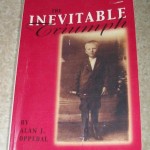An Unembellished War Story
A short-term soldier from Illinois deserves recognition for what he didn’t do after the war.

Author Alan J. Oppedal writes of the contributions his ancestors, several of whom were Civil War veterans, made to the establishment and development of a rural Iowa community.
I don’t know what initially attracted me to The Inevitable Triumph, a thick 6″ x 9″ paperback book by Alan J. Oppedal. It may have been the title, a phrase borrowed from FDR’s “a date which will live in infamy” speech. It may have been that Oppedal’s name seemed somehow familiar to me. It may have been the cover photo of a too-serious blond boy clad in jodhpurs.
Whatever it was, it compelled me to remove the book from its shelf and read its back cover. I learned that the self-published volume chronicled the history of a rural Iowa community straddling Lake Township in Clay County and Lost Island Township in Palo Alto County, a community Oppedal’s ancestors helped settle and nurture in the decades after the Civil War. Having grown up in Clay County, I knew the setting well. This geographical connection to my past, coupled with Oppedal’s 25-page opening section about the Battle of Gettysburg, compelled me to buy the book.
Two of Oppedal’s ancestors, Private Morton Prothero of the Sixth Wisconsin, part of the famed Iron Brigade, and Private Tapley Stewart of Cobbs Brigade in the Third Georgia Sharpshooter Battalion, saw action at Gettysburg. Both of these veterans of earlier battles survived the three days of Gettysburg and went on to fight in other bloody clashes.
However, it is Oppedal’s account of another Civil War ancestor, whose service stands in stark contrast to that of Prothero and Stewart, that I found outstanding.
John Huddars Pritchard was a student in the Rock River Seminary at Mt. Morris, Illinois when the war began. After completing his second year of study in the spring of 1862, he withdrew from the seminary to enlist in Company K of the Illinois Volunteers, which was assigned to the 69th Illinois Infantry Regiment. A three-month regiment, the 69th operated from June 14 – September 27, 1862. Its purpose was to guard Confederate prisoners being held at Camp Douglass following Union victories in the West.
Pritchard did not re-enlist after being mustered out of the 69th. According to Oppedal, he became a teacher after the war and later used the homesteading rights accorded him as a Civil War veteran to acquire land in Iowa.
Although Pritchard exercised his homsteading option, Oppedal writes he had little to say about the war:
John’s most notable war experience came when he was assigned to guard a large work detail composed of Confederate prisoners. Some of them started to wander away. John hollered, “Halt!” and they did. That was his only recollection of Civil War service passed along to his family. (61)
Commanders writing official reports often exaggerated the number of casualties their units inflicted upon the enemy. Letters penned by egotists such as George McClellan are rife with passages of shamless self-aggrandizement. Aged veterans writing memoirs fifty years after the war often magnifed their experiences.
If he were so inclined, John Pritchard could have spun a tale turning himself into a hero preventing a throng of rapacious rebels from being unleashed upon the Illinois countryside.
He could have. But he didn’t.
Oppedal can be proud of all of his Civil War ancestors.